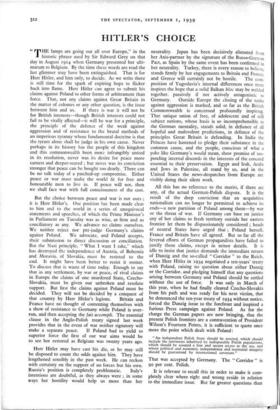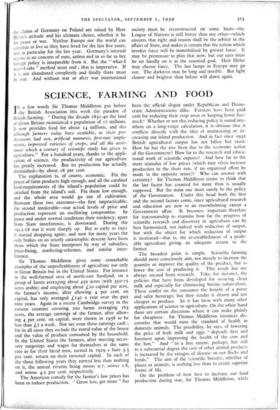HITLER'S CHOICE
" HE lamps are going out all over Europe," in the 1 historic phrase used by Sir Edward Grey on that day in August 1914 when Germany presented her ulti- matum to Belgium. By the time these words are read the last glimmer may have been extinguished. That is for Herr Hitler, and him only, to decide. As we write there is still time for the spark of expiring hope to flicker back into flame. Herr Hitler can agree to submit his claims against Poland to other forms of arbitrament than force. That, not any claims against Great Britain in the matter of colonies or any other question, is the issue between him and us. If there is war it will not be for British interests—though British interests could not fail to be vitally affected—it will be war for a principle, the principle of the defence of the weak against aggression and of resistance to the brutal methods of an imperious tyranny whose fundamental doctrine is that the tyrant alone shall be judge in his own cause. Never perhaps in its history has the people of this kingdom and this commonwealth been more infrangibly united in its resolution, never was its desire for peace more earnest and deeper-seated ; but never was its conviction stronger that peace can be bought too dearly. There can be no talk today of a patched-up compromise. Either peace or war must make the world fit for free and honourable men to live in. If peace will not, then we shall face war with full consciousness of the cost.
But the choice between peace and war is not ours ; it is Herr Hitler's. Our position has been made clear to him and to the world in a series of unequivocal statements and speeches, of which the Prime Minister's in Parliament on Tuesday was as wise, as firm and as conciliatory as any. We advance no claims ourselves. We neither reject nor pre-judge Germany's claims against Poland. We advocate, and Poland accepts, their submission to direct discussion or conciliation. But the Nazi principle, " What I want I take," which has destroyed the independence of Austria, of Bohemia and Moravia, of Slovakia, must be resisted to the end. It might have been better to resist it sooner. To discuss that is waste of time today. Enough to say that in any settlement, by war or peace, of rival claims in Europe the claims of one murdered State, Czecho- Slovakia, must be given our unbroken and resolute support. But first the claims against Poland must be decided. They will not be decided by a conquest of that country by Herr Hitler's legions. Britain and France have no thought of contenting themselves with a show of resistance to Germany while Poland is over- run, and then accepting the fait accompli. The essential clause in the Anglo-Polish treaty signed last week provides that in the event of war neither signatory will make a separate peace. If Poland had to yield to superior force the first of our war aims would be to see her restored as Belgium was twenty years ago.
Herr Hitler may have cast his die, or he may still be disposed to count the odds against him. They have lengthened sensibly in the past week. He can reckon with certainty on the support of no forces but his own.
Russia's position is completely problematic. Italy's intentions are doubtful, as they always were ; in some ways her hostility would help us more than her neutrality. Japan has been decisively alienated from her Axis-partner by the signature of the Russo-German Pact, as Spain by the same event has been confirmed in her neutrality. Turkey, there is every reason to believe, stands firmly by her engagements to Britain and France, and Greece will certainly not be hostile. The com- position of Yugoslavia's internal differences once more inspires the hope that a solid Balkan bloc may be welded together, passively if not actively antagonistic to Germany Outside Europe the closing of the ranks against aggression is marked, and so far as the British Commonwealth is concerned profoundly inspiring. That unique union of free, of adolescent and of still subject nations, whose basis is so incomprehensible to the German mentality, stands solid, in defiance of all hopeful and malevolent predictions, in defence of the principles Great Britain is defending. In India the Princes have hastened to pledge their substance in the common cause, and the people, conscious of what a yoke like Germany's would mean, show promise of sus- pending internal discords in the interests of the concord essential to their preservation. Egypt and Irak, Arabs and Jews in Palestine, all stand by us, and in the United States the news-despatches from Europe are visibly doing their silent work.
All this has no reference to the merits, if there are any, of the actual German-Polish dispute. It is the result of the deep conviction that an acquisitive nationalism can no longer be permitted to achieve its ends—a new partition of Poland among them—by war or the threat of war. If Germany can base on justice any of her claims to fresh territory outside her eastern frontier let them be dispassionately considered ; heads of neutral States have urged that ; Poland herself, France and Britain have all agreed. But so far all the fevered efforts of German propagandists have failed to justify those claims, except in minor details. It is idle to insist that justice demands the immediate return of Danzig and the so-called " Corridor " to the Reich, when Herr Hitler in 1934 negotiated a ten-years' treaty with Poland, raising no question about either Danzig or the Corridor, and pledging himself that any questions arising between Germany and Poland should be settled without the use of force. It was only in March of this year, when he had finally cleared Czecho-Slovakia from his path and was ready for his next victim, that he denounced the ten-year treaty of 1934 without notice, forced the Danzig issue to the forefront and inspired a furious Press campaign against Poland. As for the charge the German papers are now bringing, that the present Polish frontiers are a contravention of President Wilson's Fourteen Points, it is sufficient to quote once more the point which dealt with Poland :
" An independent Polish State should be erected, which should include the territories inhabited by indisputably Polish populations, which should be assured a free and secure access to the sea, and whose political and economic independence and territorial integrity should be guaranteed by international covenant."
That was accepted by Germany. The " Corridor " is 90 per cent. Polish.
It is relevant to recall this in order to make it com- pletely clear where right and wrong reside in relation to the immediate issue. But far greater questions than the claims of Germany on Poland are raised by Herr Hitler's attitude and his ultimate choice, whether it be for peace or war. Neither Europe nor the world can continue to live as they have lived for the last five years, and in particular for the last year. Germany's internal regime is no concern of ours, unless and in so far as her foreign policy is inseparable from it. But the " what-I want-I-take " method must end ; that is imperative. If it is not abandoned completely and finally there must be war. And without war or after war international society must be reconstructed on some basis—the League of Nations is still better than any other—which ensures that right and reason shall be the arbiter in the affairs of State, and makes it certain that the nation which invokes force will be immobilised by greater force. It may be premature to plan that now, but our eyes must be set fixedly on it as the essential goal. Herr Hitler may choose force. The last lamps in Europe may go out. The darkness may be long and terrible. But light clearer and brighter than before will dawn again.



































 Previous page
Previous page